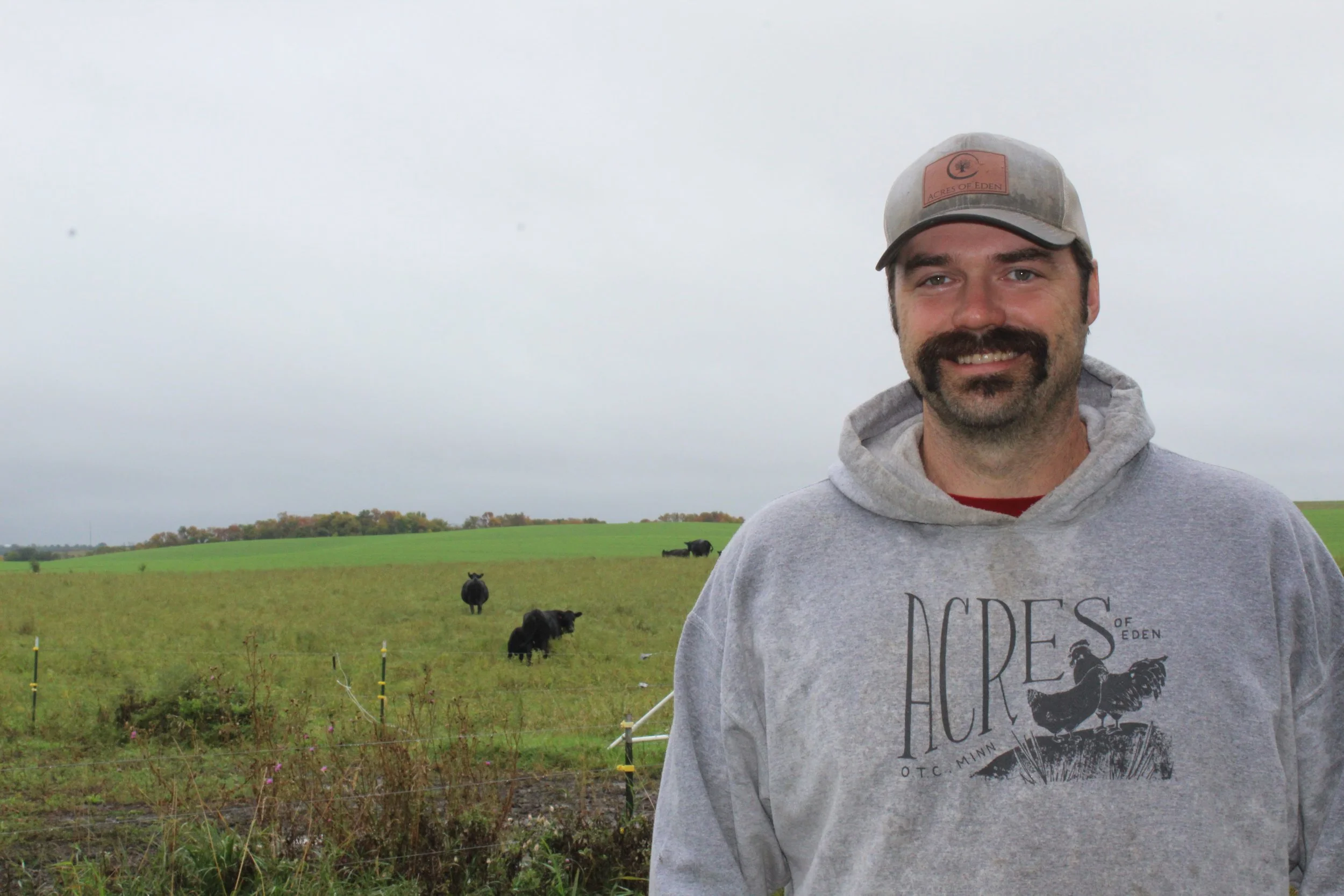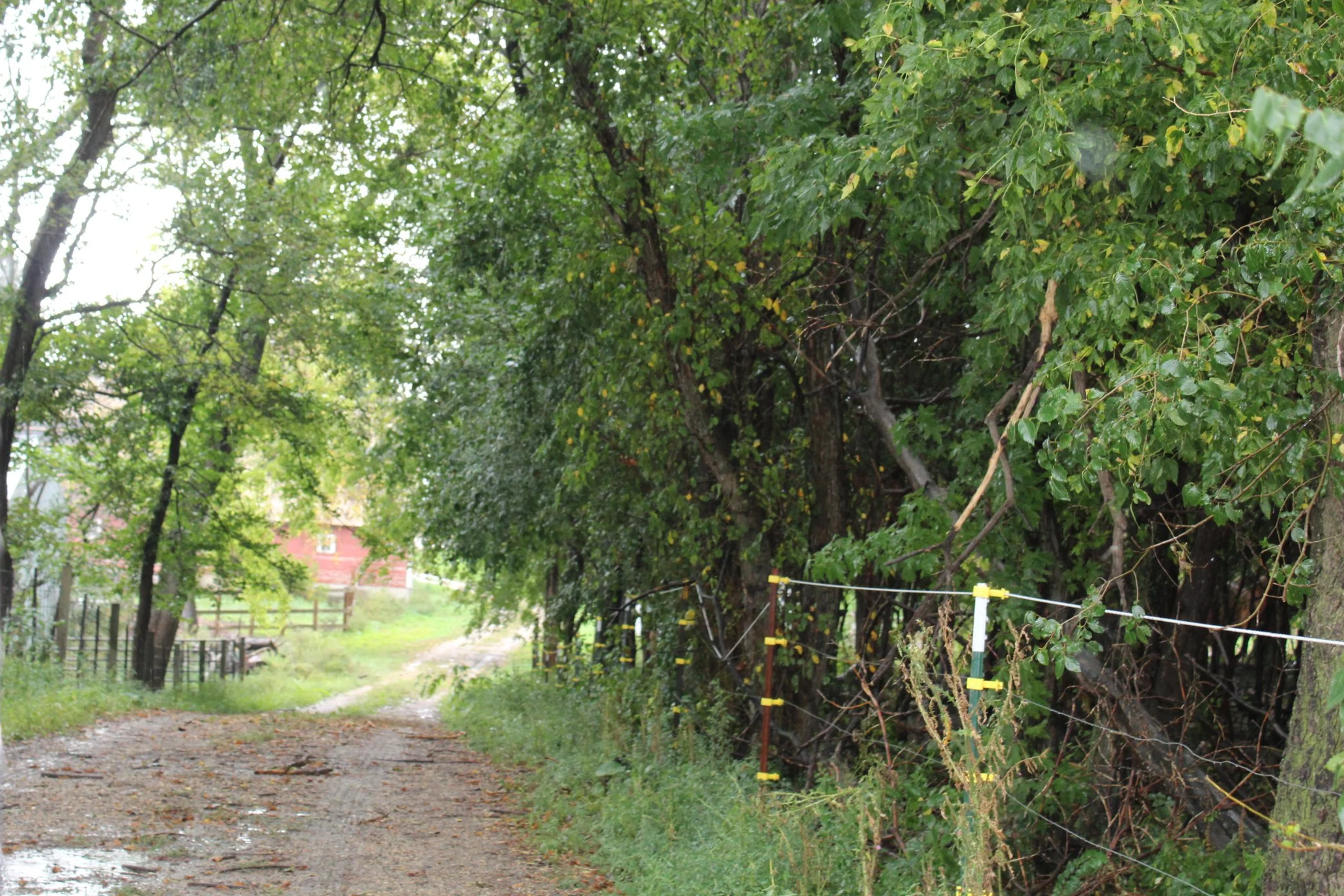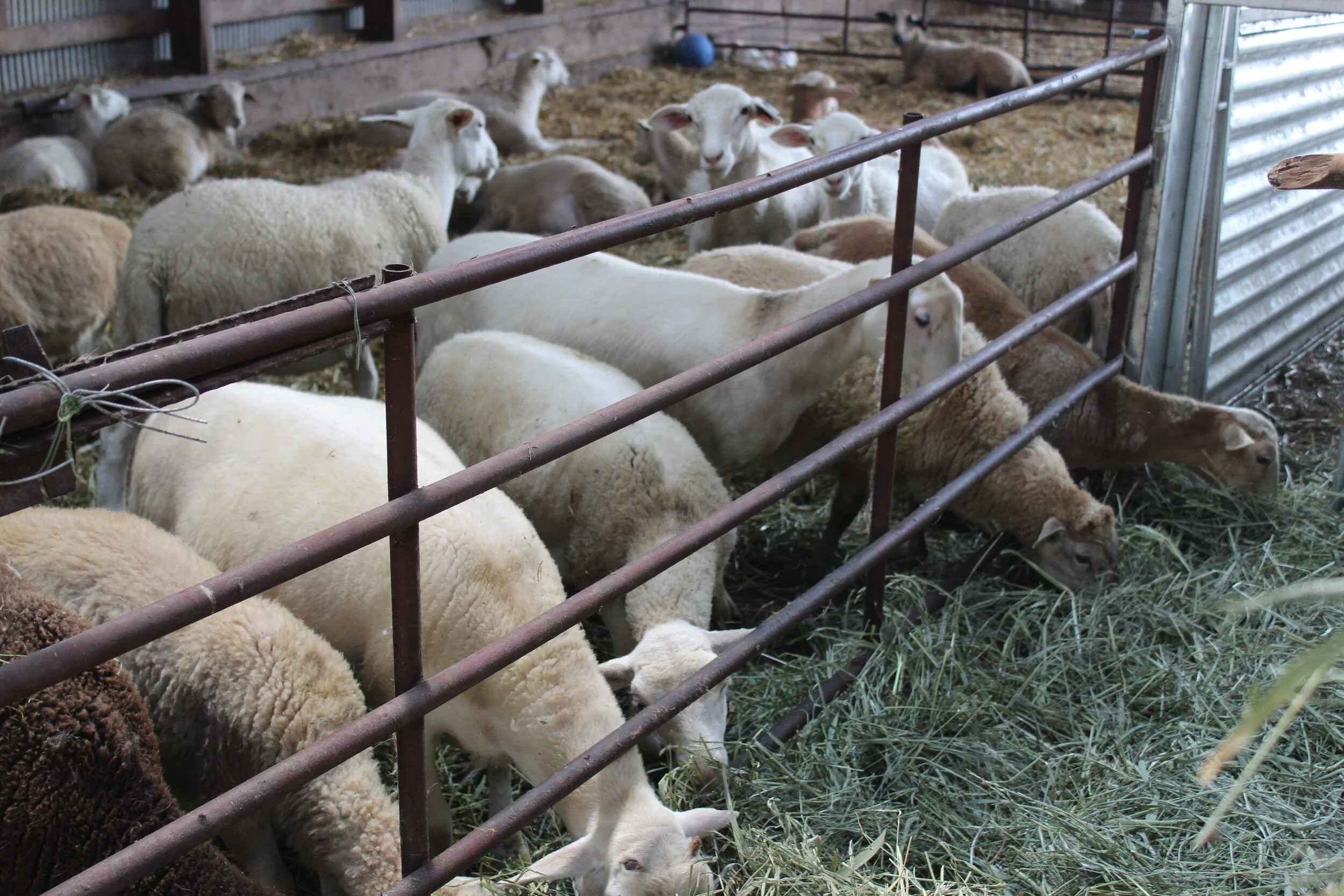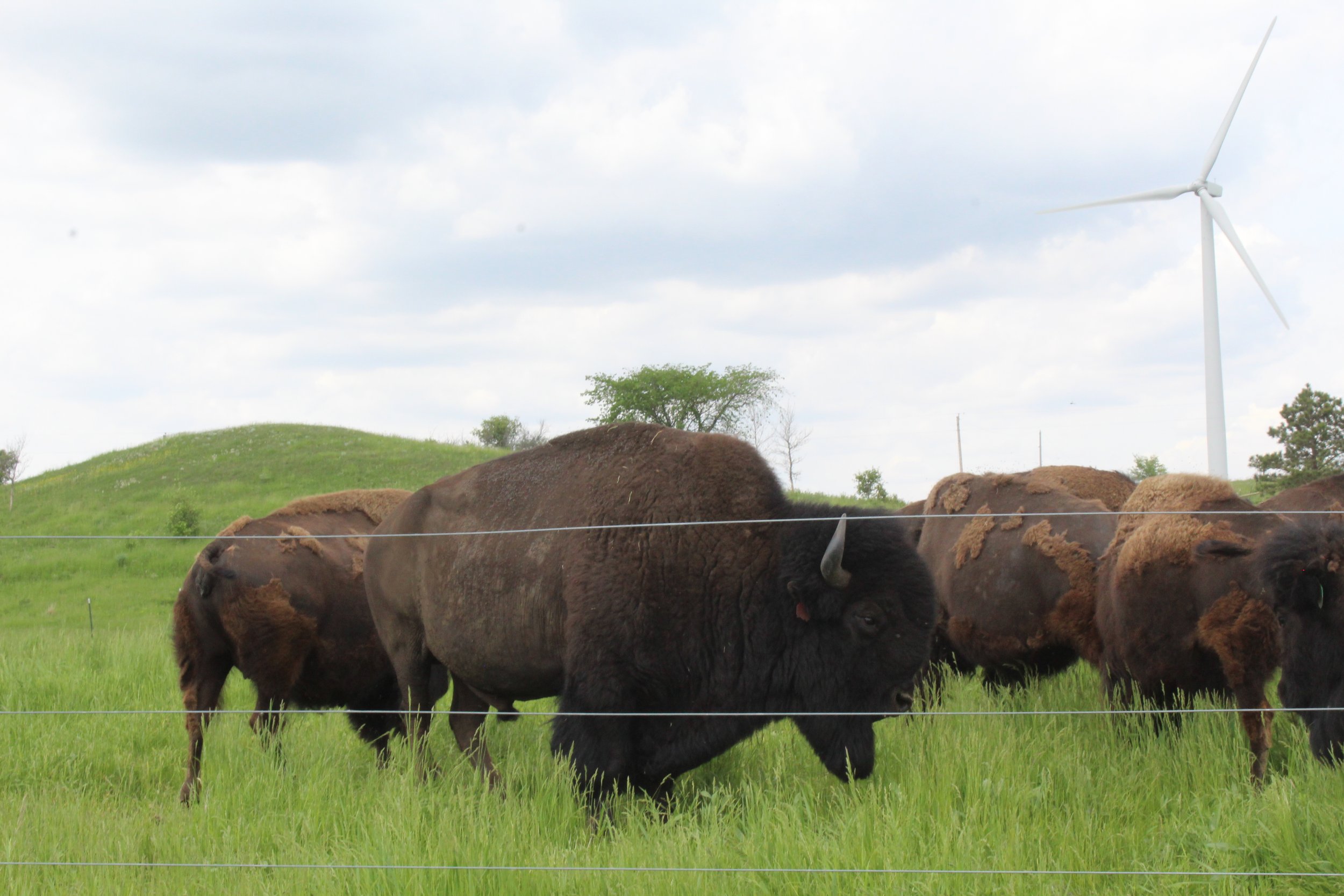Joel Haugen - Building A Path For Locally Grown
Farmer Joel Haugen of Fergus Falls is a builder.
He left college, where he was studying architecture, to be the third generation to farm his family’s land.
Joel Haugen is the third generation to farm his family’s land near Fergus Falls. He has a creative, inquisitive mindset he uses for his farm’s production and sales.
Haugen appreciates the principles of architecture and applies them in his creativity on the farm, but he didn’t see the profession as his calling or path in life. Instead of building offices and homes, he now is assembling a community of farmers, like himself, and consumers who want locally grown foods.
The vision for local foods
He calls it “Hub and Spoke”, an idea that grew from the conversations he had with his father about farming communities of the past.
“Dad was born in 1929 and I was born in 1986,” Haugen said. “That’s what put me on a different path than most people. I heard stories of community and the threshermen’s way of life. All those stories of community and what it was, that stuck with me.”
But it didn’t start right away.
His father, Harland, like all farmers, was busy. At one time the elder Haugen worked full-time for Otter Tail Power Company while also grain farming. He eventually left OTP to farm and retired in 1991. The younger Haugen started farming in 2009.
Starting his farming venture
He started farming in 2009 and took over the operation in 2012. Haugen increased the acreage from 300 to 1,700 acres focusing on conventional crop production. But something was missing. Haugen talked to his sister, Naomi, about his discontent farming conventionally. She suggested going organic.
“I started doing research and I thought it was interesting,” he said. “What drew me into it was the people at the conventions and conferences. People were willing to talk to me about it which was different than the conventional route.”
He married his wife, Christy, in 2015 and began transitioning to organic production a year later. He became certified organic in 2018 and focused on organic crops. He started cutting back on acreage.
“It was a nicer way to farm the soil, but something was still missing,” he said. “The big thing that was missing was community. So I looked to build my own production model with direct marketing and circular farming.”
Beef
He added beef to the operation in 2018 with 7 beef cattle. Two years later he added more cows and created Acres of Eden.
His beef herd is a mix of Lowline Angus, Jersey and Belted Galloway breeds. He is also breeding Waygu beef. Customers can order either individual cuts or bulk orders. His beef is either grass-fed, grass-finished or grass-fed, corn finished. All livestock receives the vitamins and minerals needed for growth and health.
The beef, which are rotationally grazed, dine on a mix of alfalfa, orchard grass and some sorghum or oats.
He focuses on genetics with the herd. Haugen wants well marbled beef for his customers.
Chickens
Chickens were added next in 2021. He now markets eggs from 4,000 chickens.
Haugen has retrofitted seven semi-trailers with roosting and nesting boxes for the birds. They are moved between two paddocks. Netting provides protection from hawks and eagles and electric fencing keeps coyotes, skunks and other four-legged predators at bay.
The eggs move on a conveyor belt and are cleaned before being placed in cartons. The eggs are sold either direct to customers or in stores in the Twin Cities, St. Cloud and Fergus Falls areas. (Stores are listed below).
Customers can order their items online through his website, acresofasher.com. Orders can be picked up on the farm.
Mealworms
Mealworms can also be ordered at his website.
The meal worms are actually an answer to Haugen’s search for a poultry feed protein source.
Poultry needs protein in the ration and, while peas and soybeans are good sources of it, they are also pricey.
Haugen searched for alternative proteins and discovered meal worms were an answer. The worms, added to the farm operation in 2024, are raised on the farm in two shipping containers. He feeds the meal worms live to the chickens and sells some to zoos and others who need meal worms for reptile and fowl feedings.
Haugen is always looking at other sources and is considering growing duckweed which is prolific in growth and another good source of protein for the fowl feed.
Hub and Spoke
He wants to expand the model to include more growers and provide for more customers.
“Agriculture has a decentralized model,” he said. “It’s amazing the number of people who don’t understand where their food comes from. There is a disconnect. There is this thought that we will always have food on hand and that idea is so far from the truth.”
He recalls how Naomi, before COVID 19, was shopping at a Trader Joes and became anxious because the store shelves were is empty. The supply truck, it turns out, had a flat tire, but one truck’s late arrival meant empty shelves.
Haugen wants to build community, like his father talked about, but bringing it into the 21st century using modern resources and technology.
He views the Hub and Spoke system as a statewide/regional-wide system to serve local consumers tie the desire that food from the farm actually travels less distance as more farmers join. As it grows, those additional farmers can supply to their local areas and they gain the ability to contribute to each other’s customer bases when the need arises.
Hub and Spoke is a community driven, regernative farming network designed to connect farmers and consumers.
Consumers pay for a membership that connects them with local growers and information growing their own food and building the community. Learn more at acresofasher.com
On his own farm, Haugen now has 280 tillable acres and raises alfalfa. The cattle graze on 80 acres in paddocks and he has 80 acres in crops. The crops - oats, wheat and barley - are used in chicken and cattle feed.
Heading into the farm place from the pasture….coming home…..
Regenerative Agriculture
Haugen is a regenerative farmer. His farming practices are more than just a method. It’s a philosophy that aims to restore and improve the health of agricultural ecosystems, he said.
Soil health is built using practices like cover cropping, minimal tillage and crop rotation. Organic matter increases using those methods.
Conservation tillage practices also lessen runoff and provide better water retention. It gives producers greater economic viability over time as fewer inputs need to be purchased.
Acres of Asher
The farm was originally named Acres of Eden, but, due to a trademark issue, the Haugens needed to change the name.
The new name came thanks to a calf.
Asher, the calf, was named by the Haugen’s younger daughter, Willa. Asher was not doing well and brought into the house for some TLC. The name sounded good, Haugen said. The family prayed over the calf and tended to its needs. But things did not look good, initially.
Then, bit by bit, Asher got stronger.
Naomi told Haugen to look up the name. He remembered it was one of the 12 tribes of Israel and that the name means happy and blessed. Also, the land of the tribe of Asher was known for its fertile soil and abundant resources which led to the tribe’s prosperity.
The idea of blessed, happy and rich soil with abundance evoked the things that Eden stood for and the new name, Acres of Asher, took hold.
I saw Asher the day I talked to Joel. It’s a healthy animal who mooed as we left its pen. He will probably be a smaller animal, but he has had a big influence on the farm.
A family affair
Haugen and Christy farm with their daughters, Jada and Willa and employ 5 full-time and six part-time workers. There are also four additional women who help with egg washing day.
Eggs for sale
Eggs are available through online order and farm pick up and also at the following stores:
Lakewinds - Minnetonka
Lakewinds - Chanhassen
Lakewinds - Richfield
River Market Community Co-op - Stillwater
Good Earth Food Co-op - St. Cloud
Holy Land Bakery, Grocery and Deli - Minneapolis
Service Food - Fergus Falls
Dutchmen Organics - Fergus Falls
Acres of Asher new membership program
Check out the lifetime membership for Hub and Spoke.
With a membership fee of $150 and annual renewal of $20, you can enjoy elusive discounts!
-5% off always
-One-time 15% off
-3% off for each successful referral
-Access to special sales, promotions and partner farms
Farms can learn more about taking part in Hub and Spoke at acresofasher.com.
And learn more about Joel and Christy’s story and product offerings at acresofasher.








